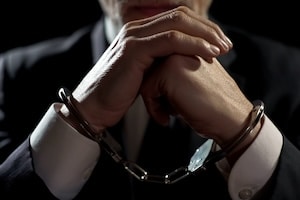Long Island Embezzlement Lawyer
Experienced Embezzlement Attorneys Serving Long Island, NY

As a Long Island criminal defense attorney with more than 29 years of experience, Edward Palermo has helped defend the rights of many individuals charged with a white collar crime on Long Island. He understands the emotional, financial, and psychological impact that being accused of a crime on Long Island can have on a person and their family.
What Is Embezzlement? How Does It Differ From Larceny and White Collar Crimes Like Fraud?
When trying to determine whether embezzlement has occurred, it is essential to revisit the definition of some key terms.
Embezzlement is the unlawful act of taking or misappropriating assets entrusted to someone’s care. It can be categorized as both a form of larceny and fraud.
Larceny, commonly known as theft, is the unlawful act of taking another person’s possessions. As a form of larceny, it is important to remember that embezzlement involves an individual having responsibility for the items they stole.
Fraud is defined as wrongful deception intended to result in personal or financial gain. Embezzlement is a kind of fraud in that a person guilty of embezzlement was entrusted to use or handle an asset a certain way but used it to further their personal gain.
A bank manager helping themself into the funds they should be safeguarding and then covering their tracks using their position would be committing embezzlement and fraud. This is because the manager is tasked with protecting the money and then used their authority to commit deception. Meanwhile, a bank robber who steals money from the bank would be committing larceny or theft. The robber in this situation has not been entrusted with the money they are stealing.
If you’ve been charged with embezzlement on Long Island, you should seek the help of a qualified Long Island white collar crime defense attorney. A skilled white collar crime attorney may be able to help you understand your rights under the law and advise you the necessary next steps.
Our team of experienced criminal defense attorneys at Edward Palermo Law, P.L.L.C. have provided skilled legal services to individuals in Long Island charged with a crime. We may be able to help you build a legal strategy that would give the best possible outcome for your case.
Grounds and Elements of Embezzlement
There are additional ways to find out whether the appropriation of assets is indeed embezzlement. A person charged with embezzlement is considered guilty if all of these elements are found to be true:
Element 1: The offender must have a fiduciary relationship with the victim.
Having a fiduciary relationship means that a person is entrusting another party to act for the person’s benefit. This involves granting that party a great deal of trust, confidence, and reliance in the assurance that the party would put aside their personal interests to further the person who put their trust in them.
- A lawyer is in a fiduciary relationship with their client as the client is putting stock in the lawyer’s skill to defend their legal rights.
- A legal guardian is in a fiduciary relationship with their ward as the legal guardian makes all the important decisions in the interest of the ward’s wellbeing.
- A doctor is in a fiduciary relationship with their patient as the patient is entrusting their life and health to their doctor.
- A trustee is in a fiduciary relationship with both the grantor and beneficiaries of a trust as the trustee is supposed to be handling a trust’s assets in the grantor’s and beneficiaries’ best interest.
Element 2: The offender must have gotten possession of the assets through their fiduciary relationship with the victim.
A vital factor to establish whether embezzlement happened, is how the offender got possession of the assets in the first place. In an embezzlement case, the offender must have been able to steal the assets due to the established fiduciary relationship. Meaning, the offender used deception to claim ownership of the assets for their personal gain when the assets should not have been theirs in the first place.
In the bank manager case, the bank manager has fiduciary responsibility over the money of the bank’s clients. By stealing from the bank, the manager is abusing this fiduciary responsibility and committing embezzlement.
Another case would be if the trustee of a deceased person’s estate abuses their role to transfer assets from the estate into their possession instead of to the beneficiaries.
Element 3: The theft should be intentional
This factor is where the element of fraud becomes crucial. For the appropriation of the assets to be considered embezzlement, the action must have been intentional. A mistake while bookkeeping or a brief oversight will not warrant criminal charges. To prove criminal culpability, the prosecution must prove that the tampering of records or the transfer of assets was done intentionally.
If there is reason to believe that the offender was coerced into embezzling assets, this can be used as a legal defense as being coerced or extorted is considered as acting against your will.
Embezzlement, fraud, and theft would still apply no matter if the offender destroyed the assets, transferred them to their possession, or to the possession of another party who is not the original owner. The breach of the fiduciary relationship and the prevention of the owner’s rights to access the property by transferring ownership through theft and fraud are what warrant the criminal charges.
The establishment of these elements, while necessary in building a case for embezzlement, will also be the deciding factor in determining the most appropriate legal strategy for your defense. Seeking the help of an experienced Long Island criminal defense attorney is important when you have been charged with embezzling funds or property.
At Edward Palermo Law, P.L.L.C., our team of qualified Long Island attorneys have helped protect the rights of individuals and avoid unjust convictions. We understand the impact being charged with a crime on Long Island can bring on a person’s life.
Long Island Embezzlement Charges
In New York, embezzlement is charged under grand larceny as it involves the theft of property.
A person is guilty of grand larceny in the specified degree when he or she steals property and when:
155.30 – Grand Larceny in the fourth degree.
- The stolen amount exceeds $1000
- The stolen property includes money, public records, scientific information or materials, credit or debit card, firearms, stealing telephone service
- The property was stolen through extortion
- Grand Larceny in the fourth degree is a Class E felony
155.35 – Grand larceny in the third degree.
- The stolen amount exceeds $3000
- Grand Larceny in the fourth degree is a Class D felony
155.40 – Grand larceny in the second degree.
- The property, regardless of the amount or nature, was acquired through coercion or extortion by threatening injury or harm to the coerced person or another party, threatening damage to property, or threatening to abuse authority as a public servant or other official duty to cause harm to another person.
- The stolen amount exceeds $50,000
- Grand Larceny in the fourth degree is a Class C felony
155.42 – Grand larceny in the first degree.
- Stolen amount exceeds $1,000,000
- Grand Larceny in the fourth degree is a Class B felony
Regardless of the degree of the charges, consulting with a qualified Long Island criminal defense attorney is vital. An experienced attorney may be able to help you build a good defense strategy. Having an attorney on your side might make the difference between your charges being dismissed or a conviction.
Consult With a Skilled Long Island Embezzlement Attorney Today

Experienced criminal defense attorney Edward Palermo of Edward Palermo Law, P.L.L.C may be able to help. Attorney Palermo, along with our team of Long Island embezzlement attorneys, can help you explore your options and navigate the complicated legal landscape. As a criminal defense lawyer, Edward Palermo has dedicated his practice to providing quality legal counsel and representation. He works hard to achieve the most favorable outcome for his clients.
For more information about embezzlement charges on Long Island, or to schedule a consultation with one of our criminal defense lawyers, call us at (516) 280-2160 or (631) 265-1052.


